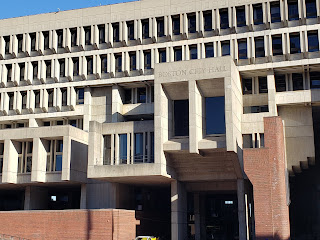Increased in-person service hours at City Hall, reopening of some BCYF day programs, and staggered reopening of BPL all eyed for June
BOSTON - Tuesday, May 11, 2021 - Mayor Kim Janey today announced the upcoming expansion of in-person city services at Boston City Hall, the Boston Public Library system (BPL), and the Boston Centers for Youth & Families (BCYF). These services will expand access to in-person city services and programming and opportunities for Boston families ahead of summer, as public health metrics continue to improve.
“As the City prepares for summer and our continued recovery from the COVID-19 pandemic, it is critical that we bring more city services back in person, especially as our public health metrics improve,” said Mayor Janey. “I want to thank all of our city departments that pivoted at the beginning of the pandemic to continue to deliver critical services to residents safely. I’m excited to welcome back more residents to City Hall and for the joy that reopening our libraries and city-sponsored summer programming will bring.”
As of May 4, 2021, 44.3 percent of Bostonians are fully vaccinated, and 64.5 percent have received at least one dose. The citywide community positivity rate continues to decrease, dropping to 2.4 percent, with no neighborhoods above the 5.0 percent threshold. New positive tests in the City of Boston decreased by 28 percent over the past week, averaging 80.1 new positive tests per day. The total number of COVID-19 tests conducted in Boston remained stable at 2,960 tests, a decrease of 1% in the past week. COVID-related emergency room visits decreased by 6 percent over a two week period, and the percentage of occupied non-surgical ICU beds is 91 percent, under the threshold of 95 percent. We currently have 75 COVID-19 patients in Boston hospitals. That is one of the lowest numbers recorded since the start of the pandemic.
The Boston Public Health Commission closely tracks six core metrics to monitor the progress of the City’s response, to guide decision making and to shape our response moving forward. The metrics being monitored include trends related to the number of positive tests, overall positivity and how COVID-19 is impacting our healthcare system.
Due to continuing improvement in the City’s COVID-19 metrics, the following service changes will take effect in the coming weeks:
Boston City Hall
Starting Monday, June 7, 2021, Boston City Hall will be open to the public by appointment only for a fourth day each week. In addition to Tuesday, Thursday and Friday, residents will be able to make in-person appointments on Monday as well. For the latest status of City departments, visit here.
Boston Public Library
The Boston Public Library will reopen for limited in-person services in June. With these expanded services, BPL will prioritize bringing back critical services that help residents with economic and educational recovery, and will be scheduling robust summer programming for both adults and youth. All reopening plans will follow the latest public health guidance, and BPL will provide further information in the coming weeks.
Boston Center for Youth & Families (BCYF)
Boston Centers for Youth & Families (BCYF) will increase its youth programming to align with Phase Four, Step One of the Reopening Massachusetts plan. This will allow for the expansion of programming for children and youth, including arts and crafts, fitness classes, and game nights. Additionally, BCYF will offer summer day programs at several centers this summer, including Camp Joy, which provides programming for children and young adults with special needs. BCYF will provide further updates about their summer programming in the coming weeks, all in accordance with public health guidance. For more information, visit boston.gov/BCYF.
“Boston’s long fight against COVID-19 is starting to bring the end of this pandemic into view,” said Mayor Janey. “I’ve asked my chiefs of Health and Human Services and Economic Development to take a look at accelerating Boston’s reopening timeline, in light of improving public health metrics across all of Boston’s communities.”
The City of Boston will continue to monitor public health metrics and adjust services and openings based on the latest COVID-19 data and trends. For more information on reopening, visit boston.gov/reopening.
Source: Mayor's Press Office














